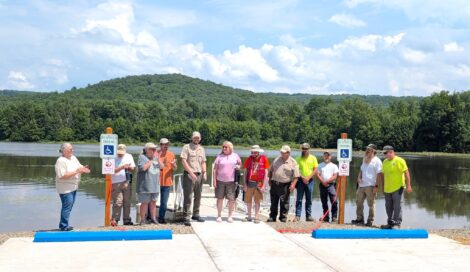Unused state land is explored for transformation

Times Observer photo by Josh Cotton An unutilized structure at the Warren State Hospital is included in a report by the Joint State Government Commission that examined the possibility of transforming unused state property into drug treatment centers.
A state House of Representatives resolution last year called on the Joint State Government Commission to explore how unused state property might be repurposed, specifically to house drug treatment centers.
A vacant building at the Warren State Hospital was identified in the report.
While no specific recommendations were made regarding the Warren site — an unused greenhouse carrying a contents replacement value of over $4 million — the report came to at least one clear conclusion: “Of the properties listed as vacant on the state inventory, those likely to be most suitable for use as drug treatment facilities are on the campuses of recently closed or unused buildings at still operational state hospitals.
“The primary advantages of repurposing state hospitals is that they are already located in areas already ideally suited to provide medical care. There are currently six active state hospitals, most of which have at least one vacant building.”
The effort to explore the possibility is related to some sobering statistics presented in the report — that Pennsylvania ranks fourth in opioid deaths per 1,000 people when adjusted for age and that the state also ranks 16th in alcohol consumption, with over 25 percent of Pennsylvanians reporting that they binge drink, five times higher than the national rate of 5.8 percent.
Those challenges are further exacerbated by the COVID-19 pandemic.
“While public life in the state may seem at a stand-still due to the pandemic, it has not diminished the state’s opioid crisis, nor prevented high levels of alcohol consumption,” the report concludes. “What the pandemic has done is make… treatment more difficult. Experts worry that secondary side effects of the pandemic could include high levels of anxiety and mental distress which may cause some to turn to substance use as a coping mechanism.”
The commission acknowledges that “unfortunately, there are no easy means to determine whether unused state property will be suitable for conversion into a drug treatment center.”
A host of identified challenges — concerns about crime rates around treatment centers, community opposition, zoning and subdivision regulations — as well as practical concerns such as building code requirements — must be considered.
The process to dispose of state property is outlined and it’s also quite onerous.
“While this report provided the basic elements to determine where in Pennsylvania the opioid crisis is most acute and indicates what vacant and closed state land may be available for reuse, state government officials and private operators will need to examine each site on a case-by-case basis to determine if a particular site is suitable for use as a drug treatment center,” the Commission concludes. “A full feasibility study conducted by experienced and independent professionals should be a priority in any location that would require extensive renovations to site a drug treatment center. These studies help ensure that business plans are technically possible, legal, and financially sustainable.”
The Commission returned several recommendations to the Department of General Services — specifically on property management issues — oher state entities as well as municipalities and the General Assembly.
“The General Assembly should consider the sale, gifting, and or rent of state property for the use by drug treatment entities on a case-by-case basis based on the merits of each property and service provider,” they conclude. “Municipalities with space but only nominal resources should explore the creation of drug free activity centers which can help aid the recovery process and integrate persons undergoing treatment for substance use disorder closer to their communities.”




